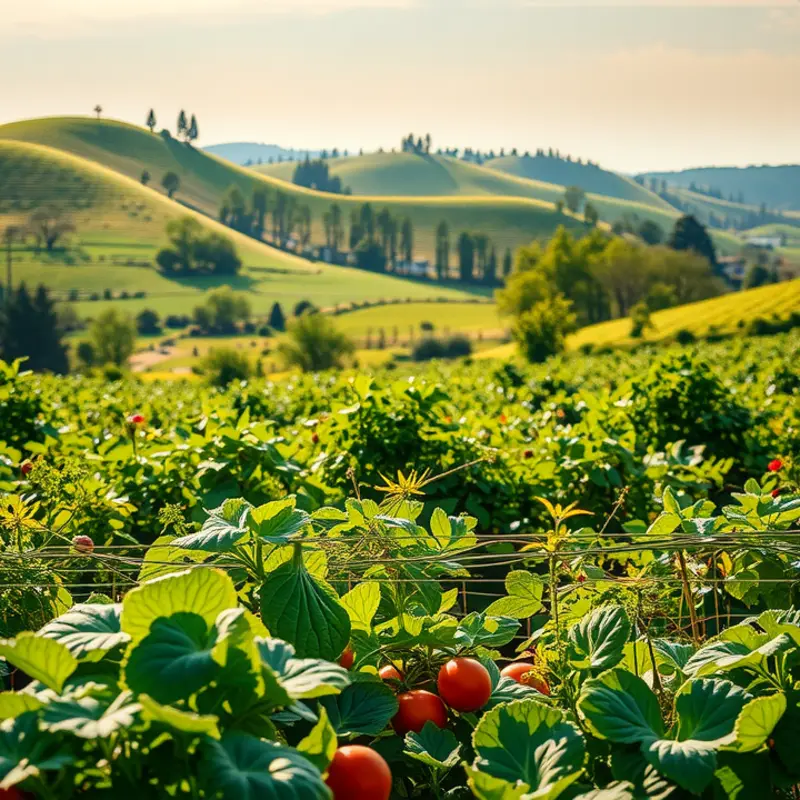Choosing ethical fruits and vegetables isn’t just a personal choice; it’s a powerful step towards a more sustainable future. By prioritizing eco-friendly food options, environmentally-conscious individuals can contribute to the health of our planet. From organic farming practices to local sourcing, understanding how these decisions impact the environment can empower us to make choices that align with our values. This exploration will guide you through meaningful ways to support sustainable agriculture while enjoying delicious, nutritious produce.
Understanding Ethical Sourcing

Sourcing fruits and vegetables ethically is a pivotal aspect of sustainable living. Opting for organic farming, local sourcing, and seasonal eating not only benefits personal health but also has substantial environmental and economic impacts.
Organic farming is fundamental to ethical sourcing due to its emphasis on natural growth processes. By avoiding synthetic fertilizers and pesticides, organic farming supports soil health, helping it retain nutrients and water more efficiently. Healthier soil contributes to healthier crops and reduces erosion. Furthermore, this method enhances biodiversity by creating habitats for various organisms, supporting eco-balance and pest control without harmful chemicals.
Local sourcing, on the other hand, offers a unique set of advantages that align with ethical sourcing principles. Purchasing fruits and vegetables from nearby farmers reduces the carbon footprint associated with food transportation. Food transporting often involves significant fuel use and emissions, contributing to environmental degradation. Local sourcing diminishes this impact, providing fresher produce while reducing environmental costs. Additionally, supporting local farmers boosts the local economy and fosters community resilience. Farmers receive fair compensation, empowering them to sustain and improve their sustainable practices.
Seasonal eating aligns with both organic and local sourcing. Consuming produce harvested at its natural peak reduces the need for artificial preservation methods that often involve chemicals. Seasonal fruits and vegetables tend to have richer flavors and higher nutritional values due to shorter storage times. This practice not only enhances personal health but also supports environmental sustainability by minimizing energy consumption required for transportation and storage.
Incorporating ethical sourcing practices into your shopping habits can be straightforward. Begin by visiting farmers’ markets or stores that prioritize local produce. Establish a relationship with vendors to better understand their farming practices. Look for organic certification labels to ensure what you buy adheres to organic standards. Aim to consume seasonal produce, taking advantage of time-specific flavors and nutrients.
Moreover, maintaining awareness of proper food storage can optimize the benefits of these practices. For tips on sustainable storage solutions, consider exploring resources like eco-smart kitchen storage, emphasizing minimizing waste and maintaining food integrity.
By integrating these choices into your lifestyle, you help cultivate a healthier planet and community. Ethical sourcing supports biodiversity, soil health, and local economies while reducing carbon footprints—a holistic approach that nourishes both body and planet.
Practical Tips for Sustainable Grocery Shopping

Equipping yourself with practical strategies for sustainable grocery shopping can significantly decrease your ecological footprint. One of the simplest actions is to prioritize local produce. By doing so, you not only support nearby economies but also reduce the carbon emissions associated with long-haul transportation.
Reading labels is another essential skill. Look for certifications like organic, fair trade, or Rainforest Alliance. Each label indicates specific standards in farming practices, ethical labor, or environmental care. While these labels do entail slightly higher costs, they often represent investments in cleaner agriculture and humane treatment of farmworkers.
Embracing the changing seasons can transform your diet into a more sustainable one. Fruits and vegetables ripen in distinct times of the year in nature. Eating seasonally ensures you enjoy produce when it’s at its peak in flavor and nutrients. A seasonal diet local to your area reduces reliance on imports that contribute significantly to greenhouse gas emissions.
Supporting local farmers’ markets is an excellent way to purchase fresh, nutritious produce while minimizing ecological impacts. Market vendors often offer items directly from their farms, meaning the produce travels fewer miles and retains more nutrients compared to items in supermarkets. Plus, these markets often encourage the use of reusable bags and often sell items with less packaging, aligning with low-waste principles.
Creating a balanced shopping list is crucial. Start by planning meals around available seasonal items and integrating them with staples you already have. This approach is more efficient and can help reduce food waste. For instance, consider practical batching techniques to optimize ingredient use and extend the life of your groceries.
When you’re in the store, aim to shop the perimeter first. This area typically houses fresh produce, bulk grains, and proteins. Center aisles often contain processed items which generally have a higher environmental toll. Prioritizing whole foods not only supports environmental health but boosts nutritional quality in your diet.
Moreover, when considering packaging, choose produce with the least or recyclable packaging. Single-use plastics and non-recyclable materials, often used for individual servings and convenience items, contribute massively to ecological degradation. Opting for items packaged sustainably or buying in bulk can make a considerable difference.
Lastly, remember that small adjustments compound to significant change. Implementing even a few of these strategies consistently can contribute to a positive societal shift toward sustainability. Each choice you make reflects a step towards minimizing environmental impact while promoting the nourishment of both planet and person.
Final words
Making ethical fruit and vegetable choices is a journey that combines personal responsibility with the power to influence the broader food system. By understanding the importance of organic and local sourcing, alongside practical shopping strategies, you can contribute to a sustainable future. Each small change in purchasing habits can lead to significant positive impacts on the environment and community. Embrace these choices with confidence, knowing that your actions support a healthier planet for generations to come. Together, every choice can lead to a ripple effect of change, showcasing the profound impact mindful consumption has on our world.








